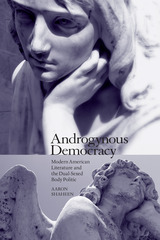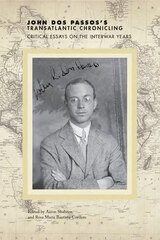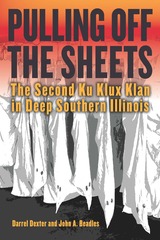
Androgynous Democracy examines how the notions of gender equality propounded by transcendentalists and other nineteenth-century writers were further developed and complicated by the rise of literary modernism. Aaron Shaheen specifically investigates the ways in which intellectual discussions of androgyny, once detached from earlier gonadal-based models, were used by various American authors to formulate their own paradigms of democratic national cohesion. Indeed, Henry James, Frank Norris, Charlotte Perkins Gilman, John Crowe Ransom, Grace Lumpkin, W. E. B. Du Bois, and Marita Bonner all expressed a deep fascination with androgyny—an interest that bore directly on their thoughts about some of the most prominent issues America confronted as it moved into the first decades of the twentieth century.
Shaheen not only considers the work of each of these seven writers individually, but he also reveals the interconnectedness of their ideas. He shows that Henry James used the concept of androgyny to make sense of the discord between the North and the South in the years immediately following the Civil War, while Norris and Gilman used it to formulate a new model of citizenship in the wake of America’s industrial ascendancy. The author next explores the uses Ransom and Lumpkin made of androgyny in assessing the threat of radicalism once the Great Depression had weakened the country’s faith in both capitalism and religious fundamentalism. Finally, he looks at how androgyny was instrumental in the discussions of racial uplift and urban migration generated by Du Bois and Bonner.
Thoroughly documented, this engrossing volume will be a valuable resource in the fields of American literary criticism, feminism and gender theory, queer theory, and politics and nationalism.
Aaron Shaheen is UC Foundation Assistant Professor of English at the University of Tennessee at Chattanooga. He has published articles in the Southern Literary Journal, American Literary Realism, and the Henry James Review.

“I never could keep the world properly divided into gods and demons for very long,” wrote John Dos Passos, whose predilection toward nuance and tolerance brought him to see himself as a “chronicler”: a writer who might portray political situations and characters but would not deliberately lead the reader to a predetermined conclusion. Privileging the tangible over the ideological, Dos Passos’s writing between the two World Wars reveals the enormous human costs of modern warfare and ensuing political upheavals.
This wide-ranging and engaging collection of essays explores the work of Dos Passos during a time that challenged writers to find new ways to understand and render the unfolding of history. Taking their foci from a variety of disciplines, including fashion, theater, and travel writing, the contributors extend the scholarship on Dos Passos beyond his best-known U.S.A. trilogy. Including scholars from both sides of the Atlantic, the volume takes on such topics as how writers should position their labor in relation to that of blue-collar workers and how Dos Passos’s views of Europe changed from fascination to disillusionment. Examinations of the Modernist’s Adventures of a Young Man, Manhattan Transfer, and “The Republic of Honest Men” increase our understanding of the work of a complicated figure in American literature, set against a backdrop of rapidly evolving technology, growing religious skepticism, and political turmoil in the wake of World War I.
READERS
Browse our collection.
PUBLISHERS
See BiblioVault's publisher services.
STUDENT SERVICES
Files for college accessibility offices.
UChicago Accessibility Resources
home | accessibility | search | about | contact us
BiblioVault ® 2001 - 2024
The University of Chicago Press









